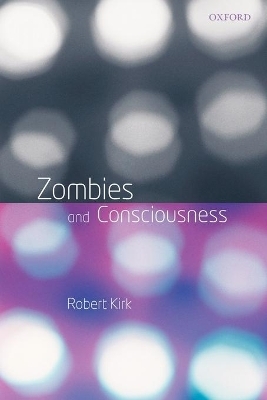
Zombies and Consciousness
Seiten
2007
Oxford University Press (Verlag)
978-0-19-922980-2 (ISBN)
Oxford University Press (Verlag)
978-0-19-922980-2 (ISBN)
By definition zombies would be physically and behaviourally just like us, but not conscious. This currently very influential idea is a threat to all forms of physicalism, and has led some philosophers to give up physicalism and become dualists. It has also beguiled many physicalists, who feel forced to defend increasingly convoluted explanations of why the conceivability of zombies is compatible with their impossibility. Robert Kirk argues that the zombie idea depends on an incoherent view of the nature of phenomenal consciousness.
His book has two main aims. One is to demolish the zombie idea once and for all. There are plenty of objections to it in the literature, but they lack intuitive appeal. He offers a striking new argument which reveals fundamental confusions in the implied conception of consciousness. His other main contribution is to develop a fresh and original approach to the true nature of phenomenal consciousness. Kirk argues that a necessary condition is a 'basic package' of capacities. An important component of his argument is that the necessary cognitive capacities are not as sophisticated as is often assumed. By focusing on humbler creatures than ourselves he avoids some of the distracting complications of our sophisticated forms of cognition.
The basic package does not seem to be sufficient for phenomenal consciousness. What is also needed is 'direct activity' - a special feature of the way the events which constitute incoming perceptual information affect the system. This is an integrated process, to be conceived of holistically, and contrasts sharply with what is often called the 'availability' or 'poisedness' of perceptual information.
This original, penetrating, and highly readable book will be of interest to all who have a serious concern with the nature of consciousness: not only professional philosophers and students, but also many psychologists and neuroscientists.
His book has two main aims. One is to demolish the zombie idea once and for all. There are plenty of objections to it in the literature, but they lack intuitive appeal. He offers a striking new argument which reveals fundamental confusions in the implied conception of consciousness. His other main contribution is to develop a fresh and original approach to the true nature of phenomenal consciousness. Kirk argues that a necessary condition is a 'basic package' of capacities. An important component of his argument is that the necessary cognitive capacities are not as sophisticated as is often assumed. By focusing on humbler creatures than ourselves he avoids some of the distracting complications of our sophisticated forms of cognition.
The basic package does not seem to be sufficient for phenomenal consciousness. What is also needed is 'direct activity' - a special feature of the way the events which constitute incoming perceptual information affect the system. This is an integrated process, to be conceived of holistically, and contrasts sharply with what is often called the 'availability' or 'poisedness' of perceptual information.
This original, penetrating, and highly readable book will be of interest to all who have a serious concern with the nature of consciousness: not only professional philosophers and students, but also many psychologists and neuroscientists.
1. Introduction ; 2. Zombies and minimal physicalism ; 3. The case for zombies ; 4. Zapping the zombie idea ; 5. What has to be done ; 6. Deciders ; 7. Decision, control, and integration ; 8. De-sophisticating the framework ; 9. Direct activity ; 10. Gap? What gap? ; 11. Survival of the fittest
| Erscheint lt. Verlag | 15.11.2007 |
|---|---|
| Verlagsort | Oxford |
| Sprache | englisch |
| Maße | 156 x 234 mm |
| Gewicht | 405 g |
| Themenwelt | Sachbuch/Ratgeber |
| Geisteswissenschaften ► Philosophie | |
| Geisteswissenschaften ► Psychologie ► Allgemeine Psychologie | |
| Geisteswissenschaften ► Psychologie ► Biopsychologie / Neurowissenschaften | |
| Geisteswissenschaften ► Psychologie ► Verhaltenstherapie | |
| ISBN-10 | 0-19-922980-5 / 0199229805 |
| ISBN-13 | 978-0-19-922980-2 / 9780199229802 |
| Zustand | Neuware |
| Informationen gemäß Produktsicherheitsverordnung (GPSR) | |
| Haben Sie eine Frage zum Produkt? |
Mehr entdecken
aus dem Bereich
aus dem Bereich
Techniken der Verhaltenstherapie
Buch (2024)
Julius Beltz GmbH & Co. KG (Verlag)
35,00 €


